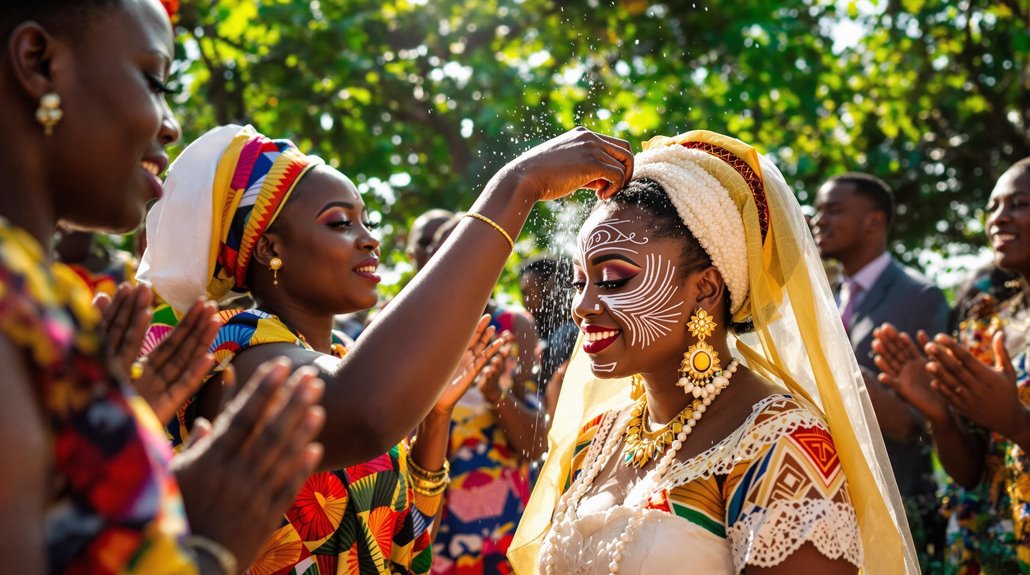When one thinks of wedding traditions, one might picture white dresses and tiered cakes, but have you ever considered spitting on a bride for luck or smashing plates to ward off evil spirits? These unusual customs reveal much about the diverse ways cultures around the world celebrate marriage.
From China’s month-long bridal weeping to the adventurous bride kidnapping in Kyrgyzstan, these rituals mix humor with deep-seated beliefs. As webexplore these intriguing practices, we will discover how they reflect each culture’s unique perspectives on love and community. Curious about how such traditions came to be? Let’s uncover their fascinating origins.
Bizarre Bridal Preparations
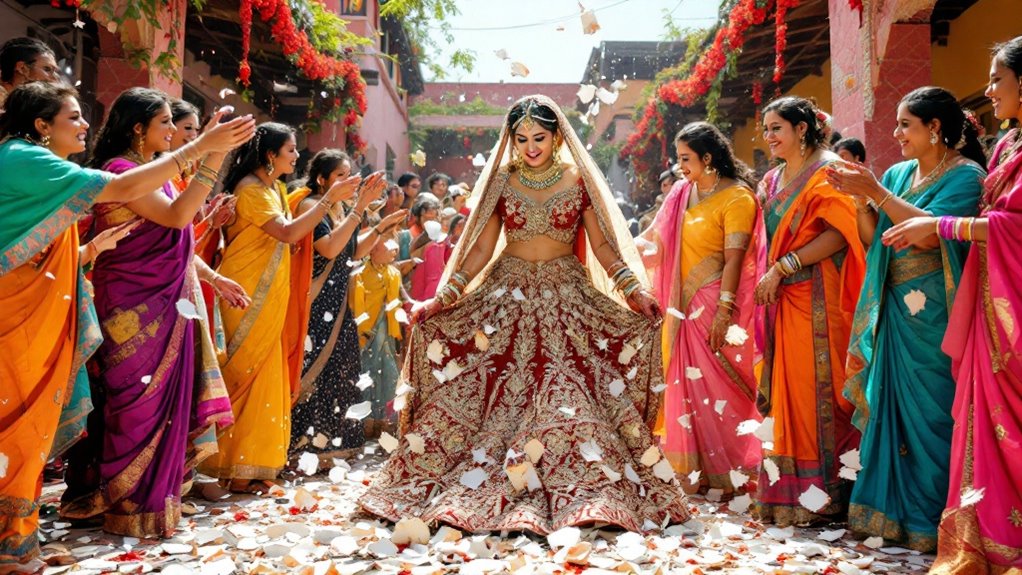
When it comes to bizarre bridal preparations, a few cultures around the world genuinely stand out with their unique practices. In China, the tradition of weeping brides is a fascinating spectacle. Picture preparing for your wedding by spending an hour each day crying. That’s exactly what Tujia brides do for a whole month! It’s not only them, though; their mothers and grandmothers join the sob-fest after ten days each.
This tradition, steeped in history, symbolizes the bride’s bittersweet shift from her family to married life. It’s like a melodramatic family reunion, where tears aren’t just welcome—they’re required. In Kenya, the father of the bride spits on her dress as a blessing, which is seen as a sign of respect and good fortune.
Crossing over to India, tree weddings offer a different kind of peculiar preparation. If you’re born under certain astrological signs, forget about marrying your soulmate first—you’ve got a date with a tree! By marrying a tree, you’re believed to ward off evil spirits and guarantee good fortune. It’s a quirky blend of astrology and botany that makes you wonder if the tree ever gets cold feet.
These fascinating rituals remind you that weddings aren’t only about the union of two people; they’re also a celebration of cultural heritage and age-old customs. In Kyrgyzstan, the practice of bride kidnapping known as ala kachuu, where the bride is abducted and a ceremony follows, adds a controversial twist to wedding traditions.
Unconventional Groom Challenges
As bizarre bridal preparations illustrate the unique paths brides take before their big day, grooms around the world face their own set of unconventional challenges. In Russia, you’d better bring your A-game, as grooms prove their worth by tackling puzzles and physical tasks, showcasing their strength, wit, and determination—qualities any partner would admire.
Meanwhile, in India, the “Joota Chupai” tradition adds a playful twist. Here, the groom’s embroidered shoes are spirited away by the bride’s family, and he must negotiate cleverly, sometimes even bribing with cash, to retrieve them. This light-hearted battle symbolizes the blending of two families and their acceptance of one another.
Across the globe in Germany, the “Baumstamm Sägen” tradition requires you to saw through a log with your partner. It’s not merely about physical strength, but a demonstration of teamwork and the shared challenges of marriage.
In China, the groom’s task is more symbolic. Shooting the bride with arrowless arrows and breaking the bow signifies eternal love—a romantic gesture with deep cultural significance.
Scottish grooms often wear kilts, showcasing cultural heritage and pride, as part of their unique wedding traditions. In many African American weddings, the tradition of jumping the broom symbolizes new beginnings, adding another layer of cultural depth to these celebrations.
These groom challenges, from negotiating ransoms in Romania to enduring foot-beating in South Korea, highlight the diverse ways cultures celebrate commitment and unity.
Lucky Spitting and Blessings
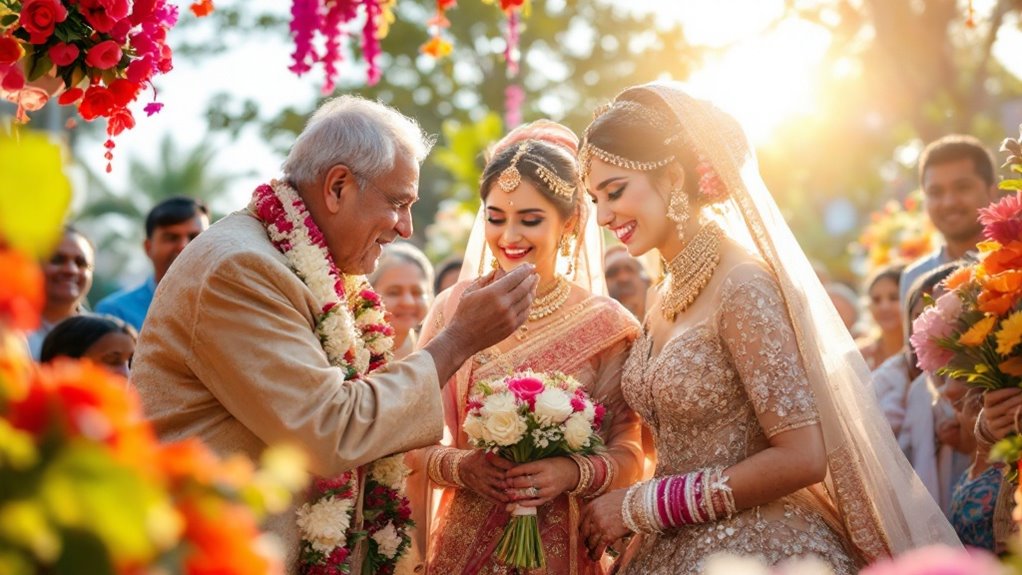
One of the more unusual wedding customs is the act of spitting, practiced in various cultures as a gesture of blessing and protection. In Maasai culture, spitting holds a deep spitting significance, with the father of the bride playing a starring role. Right before she steps into her new life, he spits on her head and chest, transferring his blessings, wisdom, and good fortune. This ceremony isn’t about saliva; it’s rich in blessing symbolism, believed to ward off evil spirits and guarantee a healthy, prosperous marriage.
Marriage is considered a pivotal societal event for the Maasai, as it represents the union of two families and strengthens alliances. The Maasai aren’t alone in this quirky tradition.
Over in Greece, wedding guests pretend to spit on the bride and groom—not literally, but with symbolic force. It’s a playful mimicry, done three times for that extra splash of luck, chasing away any lurking evil spirits. While the act itself might seem strange to outsiders, there’s a shared theme of protection and good fortune across these traditions.
Playful Wedding Games
While unusual customs like lucky spitting add a unique flair to weddings, playful wedding games infuse the celebration with joy and laughter. Envision the excitement as guests plunge into Interactive Games like Wedding Bingo or a lively Scavenger Hunt, ticking off experiences and clues that highlight the couple’s special day. Picture the hilarity of a Guess the Drink Blind Taste Test, where taste buds are put to the test, and the room fills with laughter at unexpected guesses.
Couple’s Challenges add another layer of fun, with the bride and groom engaging in The Shoe Game, raising shoes to answer questions about each other. It’s a playful way to reveal insights into their relationship. The Mr. and Mrs. Drinking Challenge adds a humorous twist, where incorrect answers lead to sips of their chosen drink, ensuring laughter echoes through the venue. Guests can also enjoy eco-friendly activities, such as creating handmade flower crowns from natural flowers, which support local flora and encourage creativity.
Lawn and outdoor games like Giant Jenga and the classic Egg Spoon Race invite everyone to join in, creating moments of camaraderie. Creative activities like the Date Night Jar encourage guests to contribute to the couple’s future adventures. These games transform weddings into lively, memorable events, sparking joy for all involved.
Community Involvement Rituals
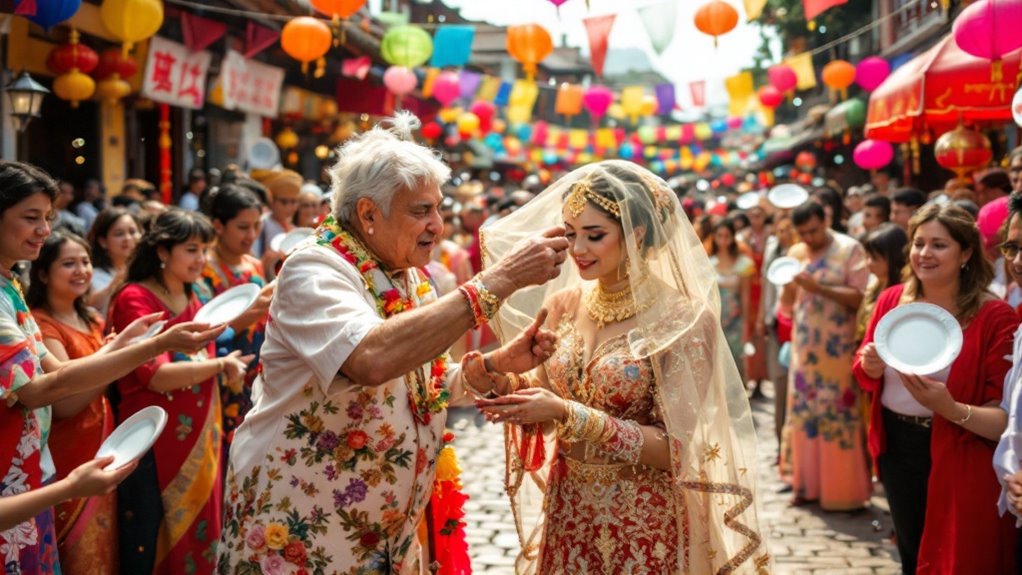
In many cultures, community involvement rituals bring a unique and lively dimension to weddings. These traditions often highlight the community’s contribution and the ritual significance of family and friends in celebrating love and unity. For example, in Romania, the bride is “kidnapped” by friends and family before the wedding, and the groom must undertake a mission to pay a ransom, usually with romantic gestures or a bottle of champagne or whisky or what the kidnappers want. It’s a playful scenario that incorporates role-play and negotiation, ensuring a hearty laugh for everyone involved. Once the bride returns, the celebrations kick off with renewed vigor.
In Sweden, the wedding ceremony becomes a community affair with their kissing tradition. Whenever the bride or groom leaves the table, guests of the opposite sex line up to give them a peck, signaled by a ringing bell. This delightful custom encourages interaction, making everyone feel like part of the love story.
Meanwhile, in South Korea, the post-wedding ritual of the groom’s feet beating involves friends and family playfully flogging his feet while he answers riddles. It’s a test of character wrapped in humor, showcasing the groom’s resilience amidst laughter. These rituals beautifully interlace communities into the wedding fabric.
Unique Proposal Customs
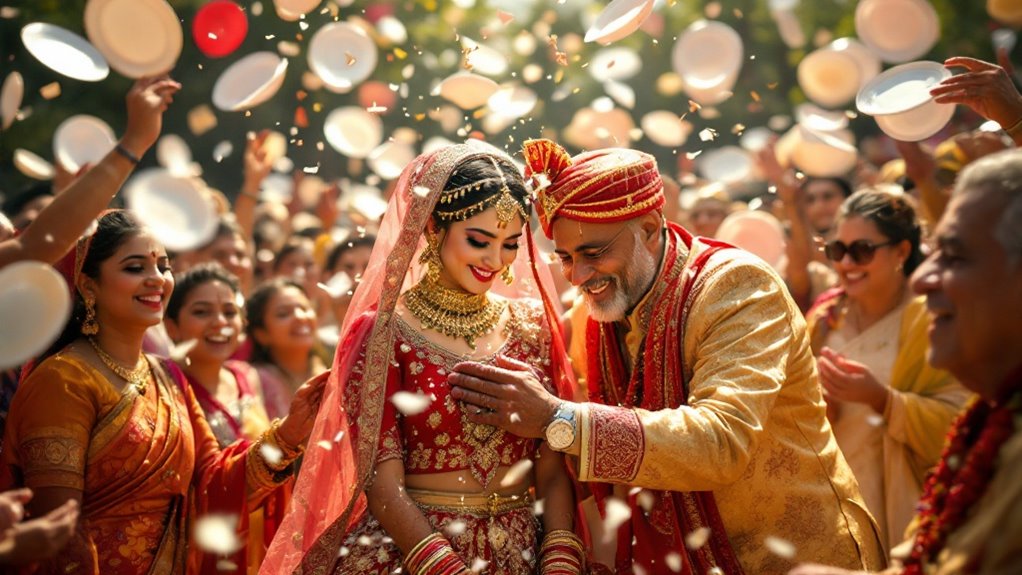
Surprisingly, proposals around the world are as diverse and colorful as the cultures they originate from, offering a glimpse into the unique traditions that shape them. Envision being in India, where the engagement ceremony, known as “sagan,” becomes a family affair filled with laughter, gifts, and the presentation of a special ring called a “mangal sutra.” It’s a striking fabric of ancestral blessings woven into a joyous event.
Hop over to Japan, and you’ll find future in-laws exchanging gifts to signify acceptance, while the couple themselves exchange long-stemmed roses tied with a red string. It’s like a floral hug of commitment, where ring exchanges transform into a poetic gesture. Meanwhile, in Cambodia, proposals are deeply spiritual, as couples seek ancestral blessings through the ritual known as “Sien Doan Taa,” honoring those who came before them with offerings of food and tea.
In Armenia, proposals take on a communal flavor with “Khosk-Armel,” a formal dinner where the groom’s family asks for the bride’s hand in marriage. It’s like dinner theater, but with higher stakes and more emotional investment! These varied customs highlight the rich fabric of global engagement practices, each colorful and meaningful.
Cultural Wedding Practices
Cultural wedding practices showcase the rich diversity of traditions across the globe, each reflecting the unique values and beliefs of its people. Take Scotland‘s blackening of the bride, where the bride-to-be is covered in a concoction of sour milk and dead fish. It’s a messy way to prepare her for future embarrassments, but it holds deep cultural significance. Meanwhile, in China, the Tujia brides undertake a month-long crying ritual. Envision shedding tears for an hour each day with your mother and grandmother joining in after ten days—it’s both a heartfelt tradition and a bonding experience.
Venturing to Fiji, the groom’s offering of a sperm whale tooth to his future father-in-law blends respect and good fortune in a beautifully symbolic gesture. In Kenya, regional variations take center stage with a meeting where families decide on the bride’s exchange, and the bride’s head is shaved and rubbed with lamb fat and oil. Talk about a unique way to start a marriage!
These practices might seem strange to outsiders, but they’re steeped in history and meaning. They remind us that love and unity can be celebrated in countless ways, each as fascinating as the next.
Wrapping up
Isn’t it fascinating how wedding traditions, no matter how strange they seem, share a common thread of love and community? It’s like stumbling upon an unexpected treasure, revealing how these quirky customs—from Greek plate smashing to Kenyan blessings—connect us across cultures. Who knew that spitting for good fortune or playful challenges could carry such heartfelt meanings? So, next time you hear about a peculiar wedding ritual, remember it’s just another colorful piece of our global human puzzle.

